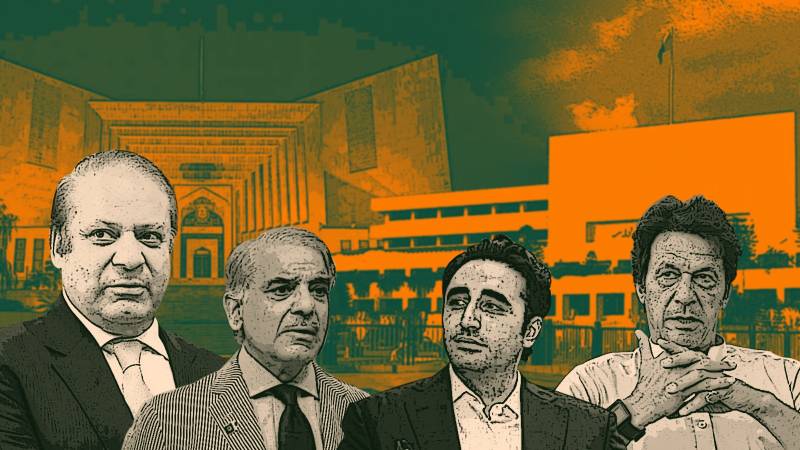
In the ever-changing landscape of Pakistan's politics, there seems to be an unbreakable bond between the Pakistan People’s Party (PPP) and the Pakistan Muslim League-Nawaz (PML-N). Gone are the days of fierce animosities and relentless political rivalries. Today, these two dynastic parties find themselves bound together by a shared purpose, much like passengers in a boat stranded in the middle of a river, with no option to turn back. This transformation began with the Charter of Democracy, an agreement brokered by Condoleezza Rice, which brought Nawaz Sharif and Benazir Bhutto together.
Bhutto declared Sharif as her honorary brother, and during the 2008 election campaign in Rahim Yar Khan, Bhutto made a bold declaration for military-supervised elections. She stated that if her party did not come first and PML-N second, she would not accept the results. Though fate did not allow her to witness the elections, the outcome reflected her wishes, even if her promises to waive farmers' loans remained unfulfilled. Asif Zardari, her husband, has since upheld her legacy by consistently supporting PML-N. His son, Bilawal Bhutto Zardari, while passionate about equality and the needs of the people, ultimately follows his father's political wisdom.
The common people find themselves trapped by hunger, disease, and unemployment, their purchasing power diminished by a government desperate for tax revenue.
Before the recent elections, Bilawal's rhetoric did shift, as he labelled Nawaz Sharif a "favored one" upon his return. However, after a reminder from his father about the level playing field, Bilawal softened his stance. Despite PPP's failure to rise above the third position, Zardari's acumen ensured they secured more than their fair share of power, holding governorships in two provinces and the Senate Chairmanship. They also aim to gain a share in Punjab's cabinet to repay political favours to the "Multanis."
The recent buzz around Bilawal's comments on the budget raised suspicions of a potential rift between PPP and PML-N, with rumours suggesting PPP's outreach to PTI for future collaboration. However, this was merely a negotiation tactic regarding development funds for Sindh and Punjab's cabinet positions, which were resolved following a meeting between Shehbaz Sharif and Bilawal. The government remains stable, with the budget set to pass and a new IMF loan agreement on the horizon.
The scenario becomes clearer when considering domestic banks have dedicated 98.5% of their deposits to the government, leaving a mere 1.5% for account holders. This allocation neglects the private sector, stifling businesses and leading to potential factory closures, machinery auctions, and widespread unemployment. Yet, the government remains indifferent, focusing on record revenues from taxes on energy products, GST, development levies, and fixed taxes.
The government is prepared to use stringent laws to suppress any dissent, maintaining a balance of power that, while burdensome for the masses, is crucial for the ruling elite’s survival.
PPP’s unwavering support for PML-N ensures that enforcing these new taxes will be straightforward, despite potential opposition protests. The government is prepared to use stringent laws to suppress any dissent, maintaining a balance of power that, while burdensome for the masses, is crucial for the ruling elite’s survival. The dynastic parties are in complete agreement and aligned with the powers-that-be. A three-and-a-half-year period out of power, during which the revisionist PTI ruled, taught them an important lesson: stick to power or perish.
The common people find themselves trapped by hunger, disease, and unemployment, their purchasing power diminished by a government desperate for tax revenue. With hoarders free and the public left cash-strapped, the government’s reliance on taxes and remittances from overseas Pakistanis becomes clear. Meanwhile the right to dissent stays curtailed. After all, British-era laws, never altered, will serve their purpose.
In this complex situation, financiers have bet everything on the government, forcing it to extract taxes from an already struggling populace. In appeasing financiers with high-interest rates, the ruling elite have forsaken both democracy and the people.
Besides contempt laws, Section 144 is a deadly tool in the hands of the government to suppress dissent. The tradition of curtailing the right to protest and freedom of speech under charges of sedition continues. Personal and political vendettas have already sacrificed privacy. The constitution's value has diminished, and power dynamics now matter, even if it burdens the masses. Maintaining this balance is crucial for the ruling elite's survival; otherwise, there's a precipice on one side and a chasm on the other.
In this complex situation, financiers have bet everything on the government, forcing it to extract taxes from an already struggling populace. In appeasing financiers with high-interest rates, the ruling elite have forsaken both democracy and the people. The metaphor of the demon’s life being tied to a parrot aptly captures this dynamic. Yet, the true identities of the demon and the parrot remain shrouded in ambiguity. Who truly holds the demon's parrot – the financiers, the ruling elite, or a complex interplay of both? This remains the critical question, as the partnership between dynasts and bankers continues to thrive at the expense of the common people. Yet, notice the irony: in appeasing financiers with over 20% interest rates, the elite have forsaken both democracy and the people. It's clear that the demon's life lies in the parrot, but who the demon is and who the parrot is remains unclear.
In this high-stakes game of power and survival, the true cost is borne by the ordinary citizens. As the dynastic parties and their financial backers tighten their grip, the populace is left to navigate a landscape marred by economic hardship and diminishing freedoms. The question remains: Who holds the demon’s parrot, and how long can this precarious balance last before it tips into chaos?

